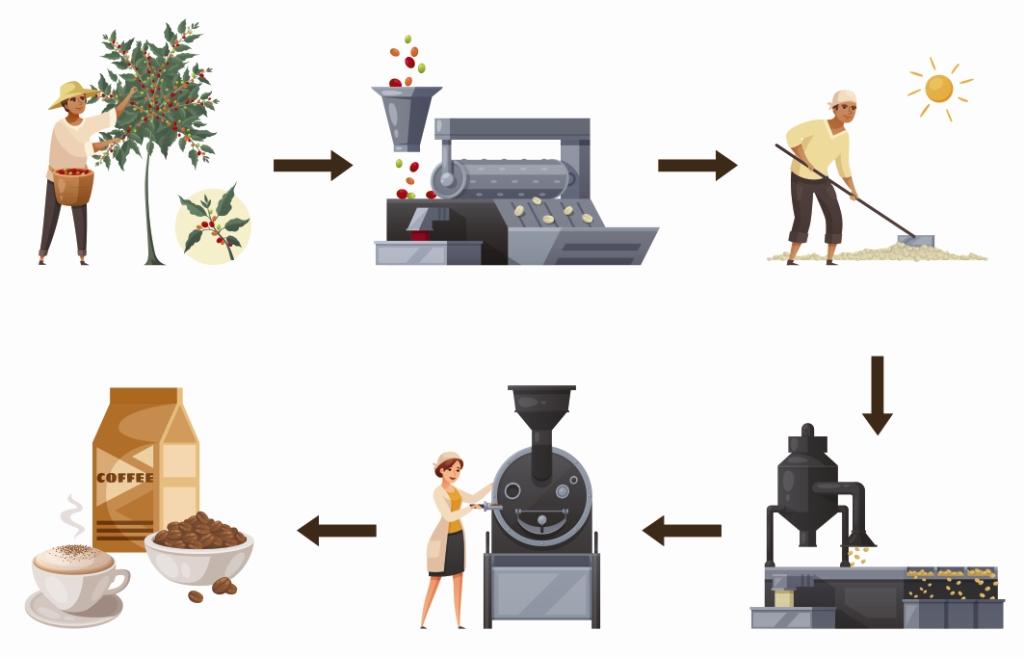Coffee is long known for its energy boosting effect to the early birds as well as people who are rushing to meet their deadlines. On the other hand, there are also coffee enthusiasts out there who enjoy exploring near and far for the best cup of coffee.
Every so often we hear about how people are experiencing heart palpitations, tremors, gastrointestinal discomfort and insomnia just from drinking coffee. Automatically, our brain registers these bad experiences while our human instincts tell us to avoid such behaviours.
Little did you know, the health benefits of coffee are also getting acknowledged and becoming more widespread. There are many ways to turn this coffee obsession of yours into an elixir of life.
Type of Roast
- Light Roast
- Acidic taste, fruity smell, high caffeine
- Medium Roast
- Bittersweet taste, caramel aroma
- Dark Roast
- Bold taste, chocolate aroma, less caffeine
Largest Coffee Producing Countries
#1 Brazil
- 2,590,000 metric tons
#2 Vietnam
- 1,650,000 metric tons
#3 Colombia
- 810,000 metric tons
#4 Indonesia
- 660,000 metric tons
#5 Ethiopia
- 384,000 metric tons
Why is it GOOD?

- Improves brain function

- Protects against Alzheimer’s and Parkinson’s Disease

- Lowers risks for Type 2 Diabetes
Why is it BAD?

- Causes anxiety

- Disrupts sleep cycle

- Raises blood pressure
Coffee from Scratch

- Planting & Harvesting
- Processing
- Drying
- Hulling
- Roasting
- Brewing
Nutrients in a mug
These tiny aromatic beans are rich in antioxidants and packed with nutrients. Although it supplies your body with a minimal amount of nutrients, it can be a great complement to your diet. Here are the few essential nutrients that you can find in your coffee:
- Manganese
- Potassium
- Magnesium
- Phosphorus
- Vitamin B2
- Vitamin B3
The safe levels of coffee consumption for a healthy adult is typically four to five cups a day (400 milligrams caffeine). Do not confuse the ‘coffee’ here as it refers to black coffee and not the 3 in 1 pre-mixed coffee that are usually loaded with sugar.
Consuming too much coffee can pose certain health risks. Depending on personal sensitivity towards caffeine, some people might suffer from symptoms like shaky hands or rapid heartbeat despite consuming within the limits. People with such issue can find it difficult to cope with caffeine withdrawal and this further harm their health.
Coffee also has the potential to raise your blood cholesterol but that does not mean that you have to completely cut off coffee. If you are mindful of your cholesterol levels, filtered coffee will be the one for you. Paper filters are able to remove cafestol from your coffee which is a compound that raises bad cholesterol levels in your bloodstream.
Healthy Coffee Drinking Manual

- Ditch the sugar

- Limit 3-5 cups a day

- Choose milk instead of creamers

- Avoid drinking after 2pm
In the end, it all comes down to the way you make your coffee. Coffee is a beverage that can be considered as healthy just like tea. You should be aware of the way your body reacts to caffeine. Most importantly, coffee can be a great health boost to your body as long as you consume it with utmost care.
Sources: Healthline, Farrers Coffee, American Heart Association, NCA, FDA











